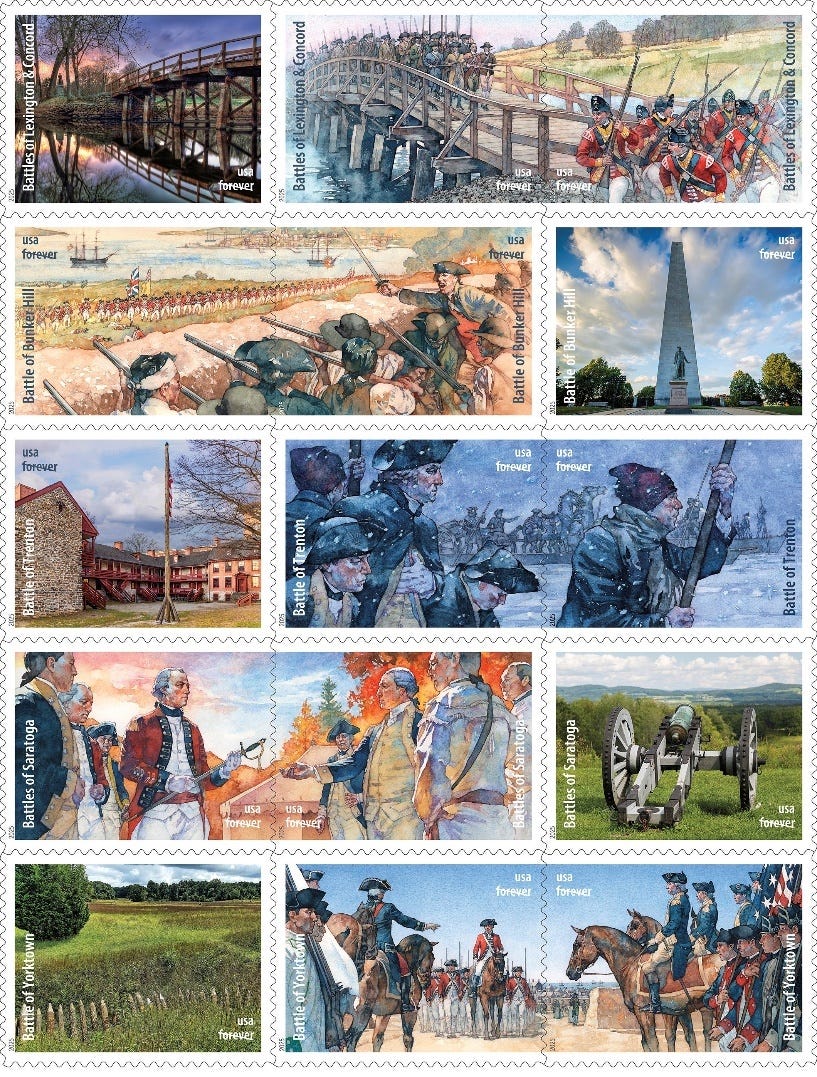Why Lexington and Concord Really Were a “Glorious Morning”
It has to do with the pronouns

Two hundred fifty years after the first battle of the American Revolution began at Lexington and Concord in what was then the British colony of Massachusetts, contemporary Americans are so polarized that we can’t even reach consensus on what aspects of the story now resonate most.
To the left, President Trump seems to be a tyrant, reminiscent of King George III or his military governor in Massachusetts during the battle of Lexington and Concord, General Thomas Gage. “The whole judicial branch is in the hands of the administration. If any of this sounds familiar…” one eminent historian of the Minutemen, reviewing the events of 1775, said pointedly at a recent event of the Colonial Society of Massachusetts. The apparent swipe at the current Supreme Court elicited some nervous laughter from the audience but no reality-check about injunction-issuing, Democrat-appointed district judges.
The accusation that the U.S. government has become like the 18th-century British monarchical empire may seem outlandish, but by now it’s been a staple of left-wing rhetoric for more than half a century, since the run-up to the bicentennial. Back in May 1971, John Kerry and hundreds of his fellow members of Vietnam Veterans against the War were arrested in Lexington as they marched from Concord as a way of demonstrating that, as another scholar put it, “the United States had become the same kind of imperialist aggressor the British had once been.”
The right has chosen its own aspects of the initial battle to emphasize, with stronger evidentiary backing. American Rifleman, a publication of the National Rifle Association, has published articles stressing that the patriot victory “would have been inconceivable had not every man been armed with his own gun.” True: “the New England yeomen were accustomed to firearms from their childhood,” as historian William Lecky put it, while the English enlisted troops “were in general almost as ignorant of the use of a musket as of the use of a catapult.”
Evangelicals have also stressed the role of Christianity in the clash. On April 15, 1775, the Provincial Congress, exiled from British-occupied Boston and meeting in the congregationalist church in Concord, adopted a resolution “as men and Christians,” referring to “that God, who rules in the armies of Heaven,” and imploring a blessing on “the union of the American colonies in defense of their rights.” The steeple of Boston’s North Church was used for the signal lanterns—“one, if by land, and two, if by sea”—warning of the redcoats’ route. Paul Revere’s ride—on a horse borrowed from Deacon John Larkin of the Congregational Church in Charlestown—was to the parsonage of Rev. Jonas Clarke in Lexington, where patriot leaders Samuel Adams and John Hancock were staying.
How troubling is the lack of a common understanding of the current political significance of the initial battle?
It just so happens that the Lexington and Concord 250th anniversary coincides with the Jewish festival of Passover, whose rituals may help to provide some reassurance. Passover itself involves retelling the story of a long-ago battle for freedom from a tyrannical monarch. The Passover Seder text includes four children asking about the history of the holiday. Among them is a wicked child who asks what the event means “to you.” By emphasizing “you,” the child excludes himself from the community.
The pronouns matter.
Henry Wadsworth Longfellow’s 1860 poem “Paul Revere’s Ride” ends:
A cry of defiance and not of fear,
A voice in the darkness, a knock at the door,
And a word that shall echo forevermore!
For, borne on the night-wind of the Past,
Through all our history, to the last,
In the hour of darkness and peril and need,
The people will waken and listen to hear
The hurrying hoof-beats of that steed,
And the midnight message of Paul Revere.
The most important word in the poem is “our.”
Interpretations may differ. That's democracy; there were factions and bitter differences in the 1770s, too. Yet so long as lovers of liberty in America and worldwide are claiming Lexington and Concord as “our” own, the battle, bloody as it was, earns the description given by Samuel Adams as he heard the gunfire in the distance: “O! What a glorious morning is this!”



In Lexington at the ceremony on 19 April there were a huge number of people with signs saying "No King! No Tyranny! Support the Rule of Law".
Both the Biden administration and the current Trump administration used a huge number of executive orders, presumably what the signs were describing as tyranny. I didn't see any signs referring to the cause of this situation, the 60-vote requirement in the Senate that prevents Congress doing much of anything, leaving the Executive Branch to rule.